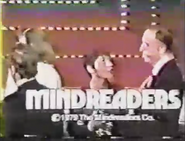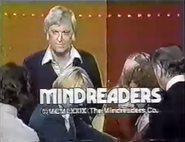| Host | |
| Dick Martin | |
| Announcers | |
| Johnny Olson Jack Narz (sub) | |
| Broadcast | |
| Pilots: 8/3/1979 NBC Daytime: 8/13/1979 – 1/11/1980 | |
| Packager | |
| Mark Goodson-Bill Todman Productions | |
"Are you a Mindreader, yes or no? Will (celebrity #1) say yes? Did (celebrity #2) say no? Find out as we play a game of hunch and ESP, Mindreaders! And now, here's the star of Mindreaders, Dick Martin!"
Mindreaders was a short-lived game show where two teams, each composed of a celebrity captain and three contestants of the same gender, competed in second-guessing their teammates' answers to provocative and funny questions.
Gameplay
Two teams of four players (three civilians and one celebrity, the latter of whom served as captain) played the game in a battle-of-the-sexes manner.
Main Game
Host Martin read a question to one team, after which they locked in their answers. The celebrity team captain's job was to predict how each player answered that question. A correct prediction kept control for the captain, who then tried to predict the answer of the next player. An incorrect guess allowed the opposing captain to predict the remaining controlling teammates' responses, regardless if they were right or wrong.
Each correct answer was worth $50, with the money going to the other team for incorrect answers, and the first team to reach $300 advanced to the bonus game. Both teams kept their money.
Bonus Game
The bonus game was played in two parts.
Judge the Jury
Host Martin asked three questions to the Jury (consisting of ten members of the studio audience), who locked in their answers depending on the criteria of the question. Each contestant on the winning team played one question and, after the Jury gave their answers, the player operating on that question tried to guess how many of the Jury members said yes or no. Guessing the number exactly won $500 for the team, while being off by one or two on either side awarded $200 (for example, guessing 5 would cover 3, 4, 6, and 7 as well). If the team failed to win any money from the jury, the bonus round ended.
Celebrity Turnabout
After the three questions were asked to the Jury, the team now tried to predict whether the celebrity captain said "yes" or "no" to another question. Each player individually chose "Yes" or "No", after which the celebrity captain revealed his/her answer. If the majority prediction from the team was correct, the cash the civilians earned from the jury was multiplied by ten, for a maximum total of $15,000.
Both teams competed against each other for three games and left the show afterwards. The most any team could win was $45,900.
Gallery
Rating
Studio
NBC Studio 4, Burbank, CA
Music & Sounds
Main – Score Productions (later used on Puzzlers in 1980)
The win cue was later used for the 1983 pilots of Star Words and Body Language.
Various stock NBC sounds were used on the show, and others afterward: the "correct answer" bell was also used on Password Plus and Blockbusters, the "wrong answer" sound was the NBC Claxon, and the sound indicating that the entire Jury locked in their answers was later used as the solo player buzz-in sound on Blockbusters and the second buzz-in sound of the 1980s Dream House.
Trivia
The idea of having 10 audience members answer a question was later instituted into the CBS revival of Card Sharks, on which Mindreaders producer Mimi O'Brien also worked.
This was the last new Goodson-Todman game to be developed within the lifetime of co-producer Bill Todman, who died a few weeks before its premiere.
The main theme was also used as a rearrange commercial cue for Celebrity Charades in 1979.
Links
The Game Show Pilot Light: Mindreaders
Mindreaders at Game Show Garbage
YouTube Videos
- A full episode from August 15, 1979 (with Patty Duke-Astin and Nipsey Russell): Part 1, Part 2
- A full episode from December 13, 1979 (with Joyce Bulifant and Jack Jones)
- The first two minutes from December 31, 1979 (with Brett Somers and Bill Daily)




